Cookie Dough Frosting starts with luxuriously rich vanilla buttercream. Next, we whip up some cookie dough that gets mixed into the frosting to create a light, fluffy, and intensely cookie-dough-flavored frosting.
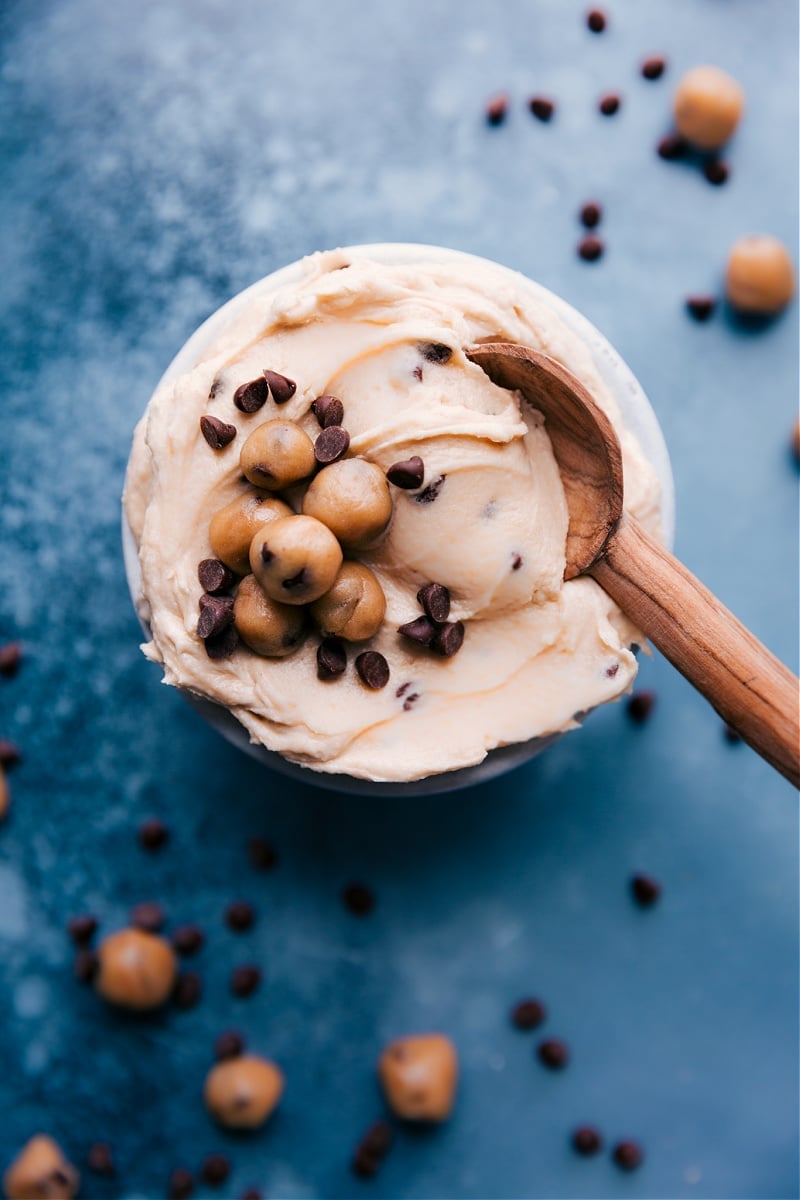
Cookie Dough Frosting
When you’ve got the dream Edible Cookie Dough recipe, you’ve got to find every excuse to use it again and again, right?! So why not add it to some Cookie Dough Oreos or add it in a delicious Vanilla Buttercream? Yes, we went there!
This frosting is sweet, smooth, light, and fluffy– the perfect addition to so many treats (more on this later). And one of my favorite things about this frosting is there is no gritty or graininess like you’ll often find in cookie dough frostings. Since we make the cookie dough and frosting separately and then combine the two, it ensures we don’t have any unpleasant textures.
Ingredients
- Cookie Dough Dry Ingredients: Flour, brown sugar, white granulated sugar, fine sea salt, and miniature chocolate chips. Make sure to heat treat the flour to eliminate any bacteria, ensuring the cookie dough is safe to eat.
- Cookie Dough Wet Ingredients: Unsalted butter, pure vanilla extract, and whole milk or heavy cream. Cool melted butter to room temperature before mixing to keep the dough from becoming greasy.
- Frosting Ingredients: Unsalted butter, pure vanilla extract, heavy cream, fine sea salt, and powdered sugar. Beat the butter until fluffy before adding other ingredients for a smoother and fluffier frosting.
Quick Tip
What is buttercream? Buttercream is one of the basic types of frosting. It’s made–as you might guess–from butter and sugar. If you find a frosted cake at the grocery store, there’s a 50/50 chance that it’s frosted either with buttercream or whipped cream frosting. Buttercream is silker, and whipped cream frosting is fluffier. The other frosting types include glaze, ganache, royal, and cooked frostings.
Let’s talk edible cookie dough
We start this frosting by making edible cookie dough that we then mix into the buttercream. What do I mean by edible? Well, technically, regular cookie dough (like you’d get in chewy chocolate chip cookies) is not food-safe to eat.
There are food safety concerns revolving around both the flour and uncooked eggs. So the edible cookie dough portion of this cookie dough frosting is specially formulated to be safe while also tasting just like regular cookie dough. There are no eggs in this recipe and we heat treat the flour to ensure everything is up to safety standards for consumption.
What is heat treating flour?
A lot of people are surprised to find flour is responsible for sickness in unbaked cookie dough. While flour doesn’t look like raw food, it actually is. It may contain germs and bacteria that can cause food poisoning. When you bake with flour, the oven’s heat accomplishes that sterilization process, but uncooked foods don’t get that same heat factor. So, we actually cook (heat treat) the flour before using it, to ensure we kill any potential bacteria. There are three options for heat-treating your flour.
- Purchase flour that has already been heat-treated.
- Heat treat it in the microwave.
- Heat treat it in the oven.
I outline the full extent of these methods for heat-treating the flour in the recipe card, but here are a few quick tips about heating treating flour:
- Let the flour cool completely before using it in the recipe; you can speed up the process by placing the tray in the fridge or freezer.
- Break up any clumps of flour and discard any discolored sections — this part of the flour is burnt and will give the cookie dough an “off” flavor.
- Heat treat more flour than you’ll need to compensate for any flour that gets burned in the process of heat treating.
- Heat-treated flour should look just like regular flour (light, fluffy, and white).
How To Use Cookie Dough Frosting
We love this frosting straight from the bowl, honestly. 🙂 Here are some other ways to use it:
- Frost cupcakes. We love these chocolate cake mix cupcakes.
- Use as a dip. This frosting is so great as a dip; we love dipping honey graham crackers, Oreo® cookies, fresh strawberries, and bananas in it.
- Frost a cake. Cookie Dough Frosting would be divine on this chocolate cake recipe!
- Top sugar cookies with it. Cookie dough frosted cookies? I mean, it seems like a lot, but YOLO!
- Make a graham cracker sandwich. Frost a graham cracker, then add another graham cracker on top. And if you want to get even fancier, dip that cookie-dough-frosting-loaded graham cracker sandwich in melted chocolate.
- Pipe it into hulled strawberries.
- Blend a few spoonfuls into a milkshake.
- Spread it over this cooled Brownie Recipe.
- Add to a bowl of oatmeal. Make breakfast more fun by jazzing up some oats with this frosting.
Cookie Dough Frosting Tips
- Set out the butter an hour before making this frosting. If the butter isn’t at room temperature, it won’t mix and whip up as smoothly. Here are some tips for how to bring butter to room temperature quickly. We also want to make sure the butter isn’t at all melted; again, it won’t whip up how we want it to.
- Use miniature chocolate chips. Larger chocolate chips are too overwhelming in the frosting — they also won’t pipe through smaller piping tips.
- Chill edible cookie dough. Once the cookie dough has been made, pop it in the fridge while preparing the frosting. This gives a chance for the cookie dough to firm up a bit, the sugar granules to dissolve, and the flavors to slightly intensify.
- The edible cookie dough portion can even be made ahead — store it in an airtight container in the fridge if making in advance. If making the cookie dough in advance, it will need to sit out at room temperature for about 30 minutes before being added into the frosting (it gets very firm being chilled for any length of time).
More dessert recipes
- Dessert Cheese Ball brownie batter-flavored
- Coconut Macaroons with a chocolate drizzle
- Edible Cake Batter with sprinkles
- Salted Caramel Cookies with a cream cheese frosting and caramel drizzle
- No-Bake Peanut Butter Cheesecake with an Oreo cookie crust
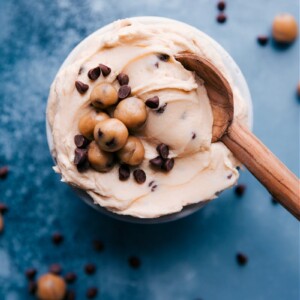
Cookie Dough Frosting
Ingredients
Edible Cookie Dough
- 3/4 cup (100g) white all-purpose flour, spoon and level to measure
- 1/3 cup (76g) unsalted butter, melted
- 1/3 cup (63g) brown sugar tightly packed (light or dark. I prefer dark)
- 3 tablespoons (36g) white granulated sugar
- 1/4 teaspoon fine sea salt
- 1 teaspoon (6g) pure vanilla extract
- 1 tablespoon (16g) whole milk or heavy cream
- 1/3 cup (60g) miniature chocolate chips
Frosting
- 1/2 cup (8 tbsp; 113g) unsalted butter
- 1-1/2 teaspoons (8g) pure vanilla extract
- 1 tablespoon (17g) heavy cream
- 1/4 teaspoon fine sea salt
- 1-1/2 cups (178g) powdered sugar
Instructions
- HEAT TREAT FLOUR: You can heat treat flour in the microwave or in the oven. See note 1. Test the flour to ensure it has reached a safe temperature of 165 degrees F. Let flour cool COMPLETELY to room temperature before using. Don't use any burnt or clumpy flour (if it's off-color or smells burnt, it is burnt). The flour should be light, white, and fluffy. Use a spoon to add the cooled flour to a measuring cup and level the top of the cup with the back of a table knife. Once you've got the cooled and measured (to 3/4 cup) flour, set aside in a separate bowl.
- COOKIE DOUGH: Meanwhile, melt the butter and then set it aside to cool back to room temperature -- hot butter will melt the sugar and cause greasy or grainy cookie dough. In a medium-sized bowl, add the melted and cooled butter, brown sugar, and white sugar. Briskly stir or whisk until smooth, about 1-2 minutes -- the mixture should be fully integrated (butter shouldn't rise or separate). Once the mixture is smooth, add in the salt, vanilla, and milk (or cream) and stir until integrated. Stir in the fully cooled flour and miniature chocolate chips. Mix until combined and smooth. Place the cookie dough in the fridge to chill while preparing the frosting.
- FROSTING: In a large bowl, add the remaining 8 tablespoons of room-temperature butter. Beat on medium speed for 3 minutes, or until completely smooth and fluffy, scraping down the sides with a spatula as needed. Add in the vanilla, cream, and salt; beat to combine. Finally, add in the powdered sugar and then beat the mixture (on low speed) to combine. Once combined, increase the speed of the mixer and beat until the frosting is very light and fluffy-- about 3-4 minutes. It should turn a lighter white. Remove the cookie dough from the fridge and break/crumble it right on top of the frosting. Beat on low speed for about 15-20 seconds just to incorporate the cookie dough into the frosting; it's okay if there are rippled chunks of dough -- this makes the frosting have a fun texture! (If you'll be piping this cookie dough through a smaller tip, you'll want to beat until all the chunks are broken down and incorporated in the frosting.)
- ENJOY: Enjoy as a dip (we love dipping in graham crackers or Oreo cookies) or frost a cake or cupcakes. We often use this frosting in our Cookie Dough Oreos! This frosting will store in the fridge, in an airtight container, for up to a week.
Video
Recipe Notes
- Heat treat it in the microwave: Add the flour to a microwave-safe bowl. I recommend heat treating more than the recipe calls for (1/2 to 1 cup extra) just to be sure you have enough. Microwave on high in bursts of 30 seconds, stirring in between each burst. Take your time stirring well to make sure none of the flour burns or clumps. Use a thermometer to test the flour in a few places to make sure it has reached 165 degrees F throughout all the flour. (If you get less than 165 degrees, return the flour for one more burst of 30 seconds).
- Heat treat it in the oven: preheat the oven to 300 degrees F. Line a large sheet pan (with sides) with a nonstick liner or parchment paper. Spread the flour on the pan (treat more than you'll use; 1/2 to 1 cup extra). Bake the flour, removing and stirring it, every 1 and 1/2 minutes. Every time you remove the flour to stir, test it with the thermometer. As soon as it reaches 165 degrees F, it's safe. (This takes about 3-6 minutes in my oven)
Nutrition
Nutrition information is automatically calculated, so should only be used as an approximation.
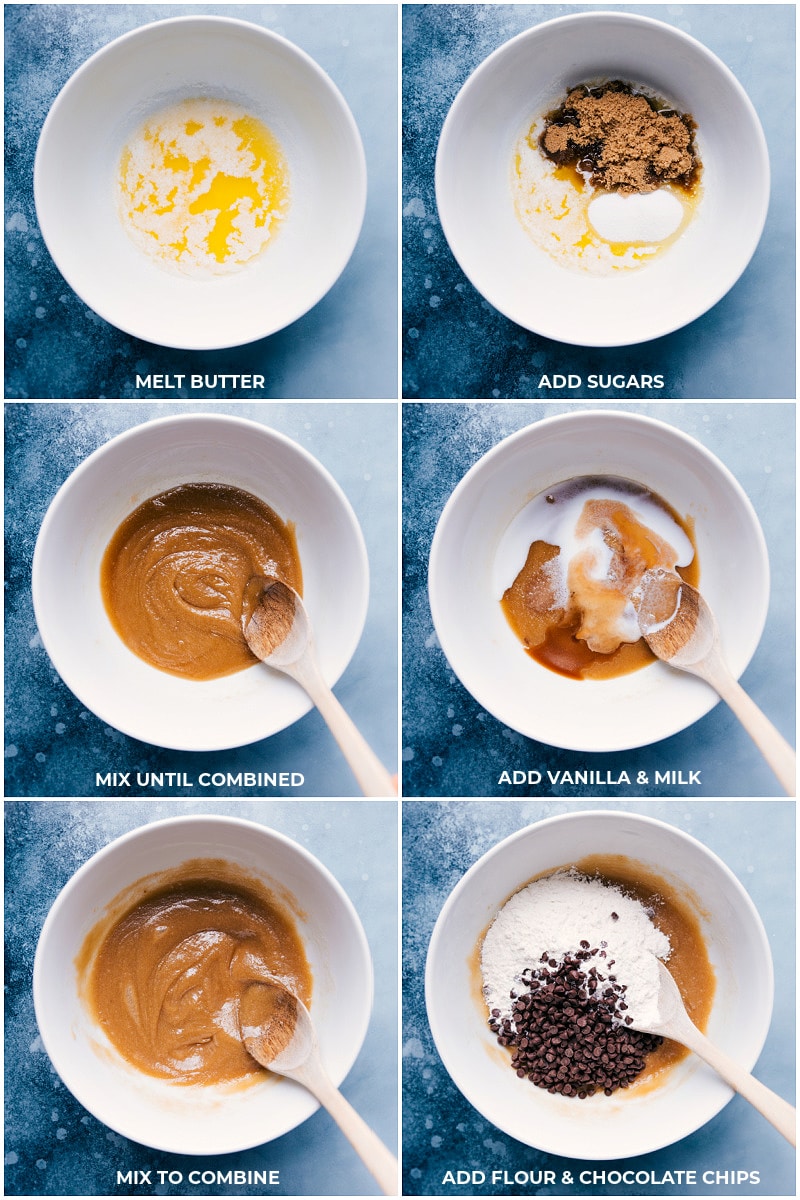
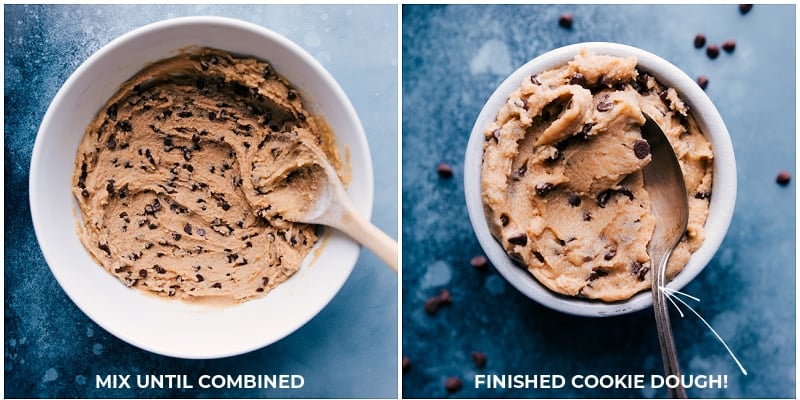
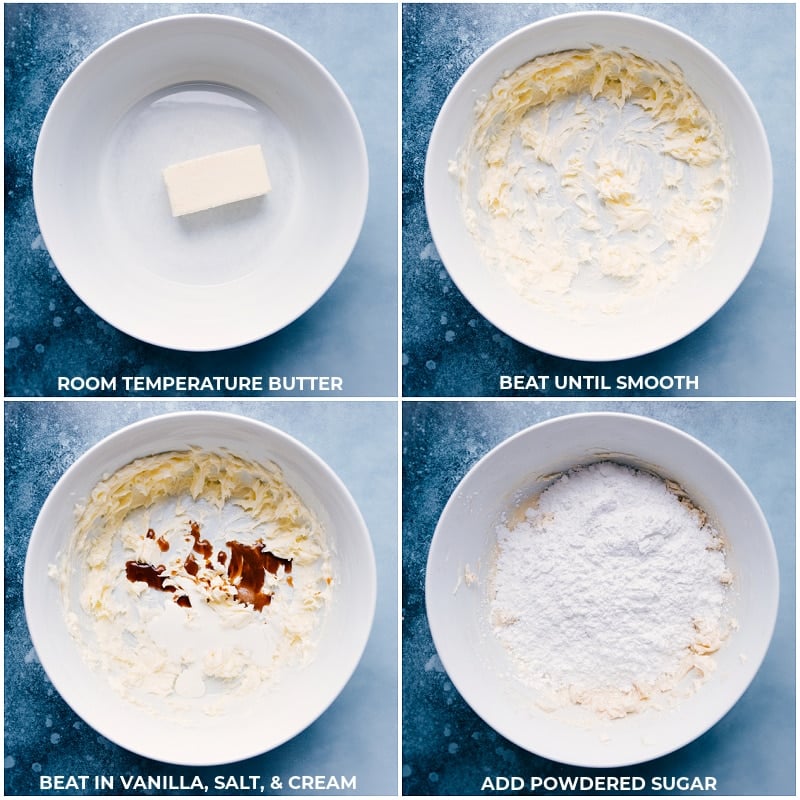
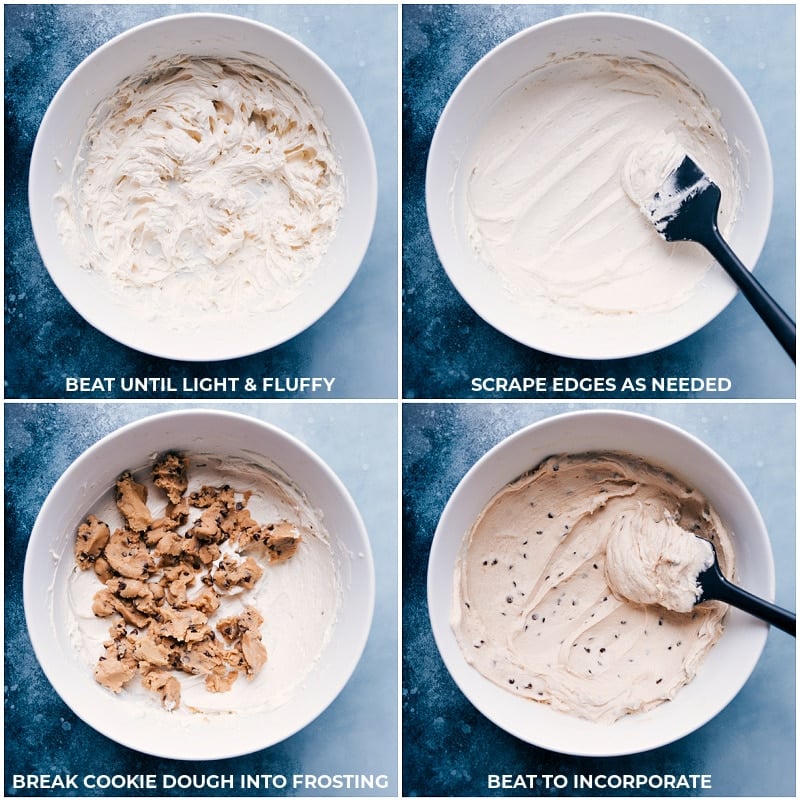
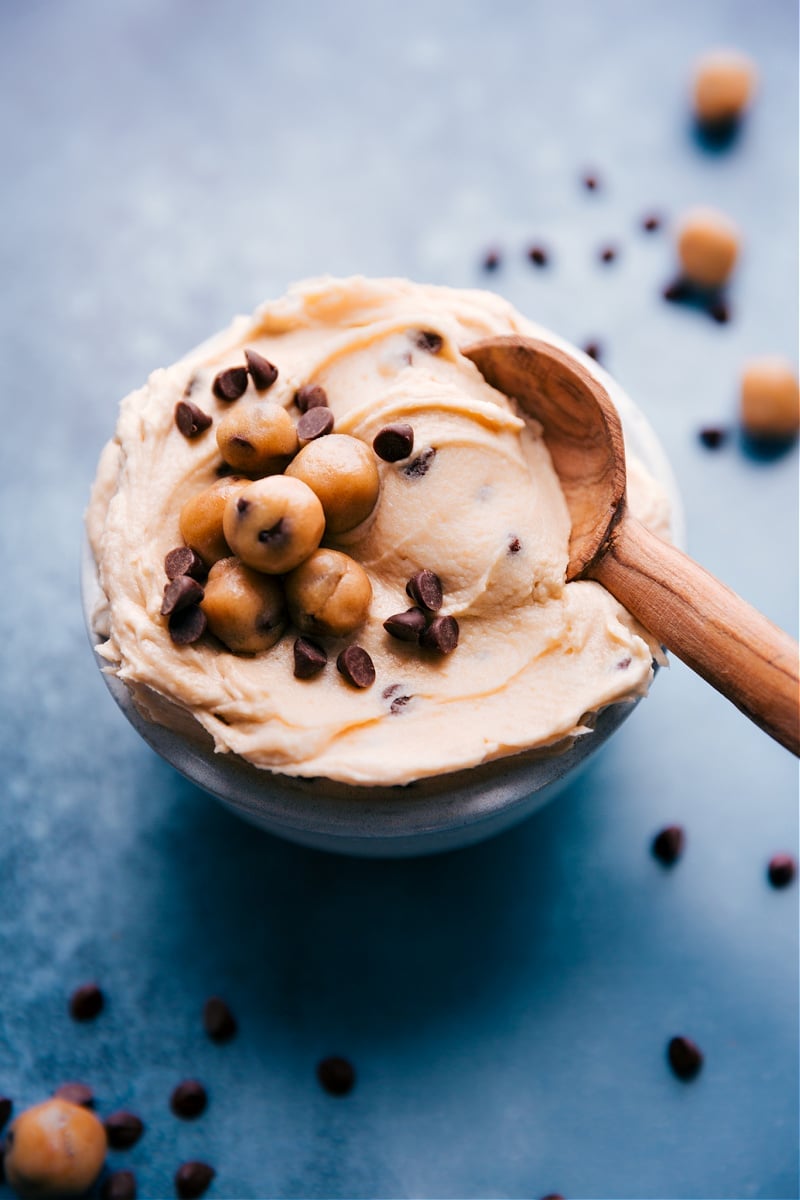



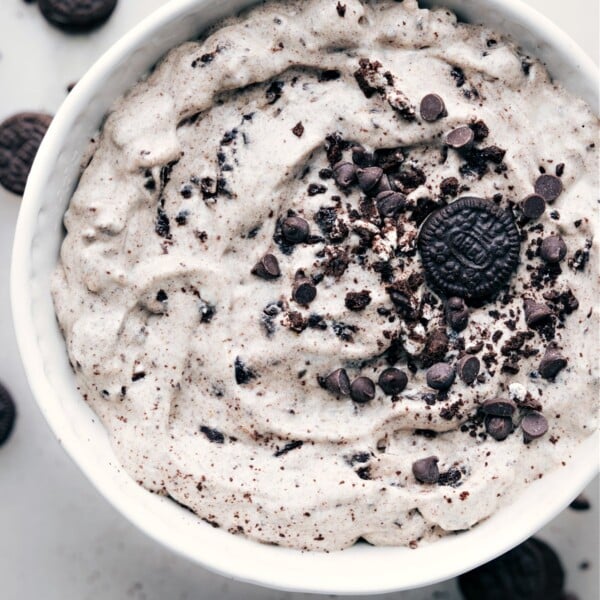
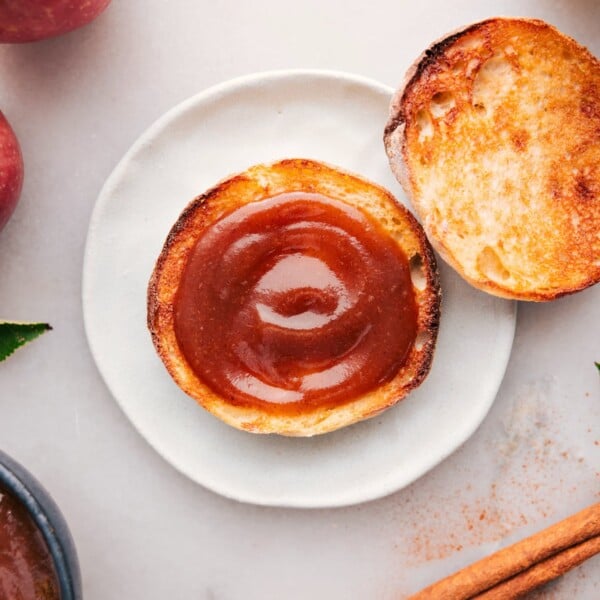
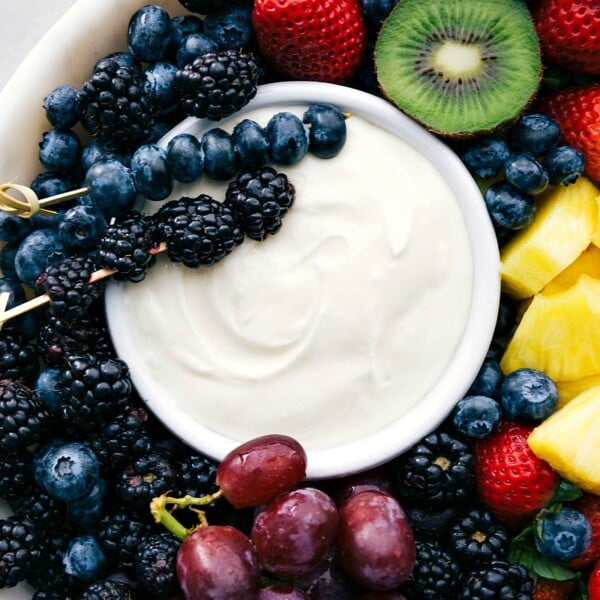









cookie dough frosting officially needs to be apart of EVERYTHING! awesome recipe chick!
Haha I couldn’t agree more! Thanks Christine 🙂
I love cookie dough frosting!
Glad you think that too 🙂 Thanks Tina!
cookie dough frosting sounds delish!
Cookie dough is one of my favorite indulgences ever! Definitely can’t wait to try this frosting 🙂
Oh good to hear! Thanks so much for stopping by 🙂